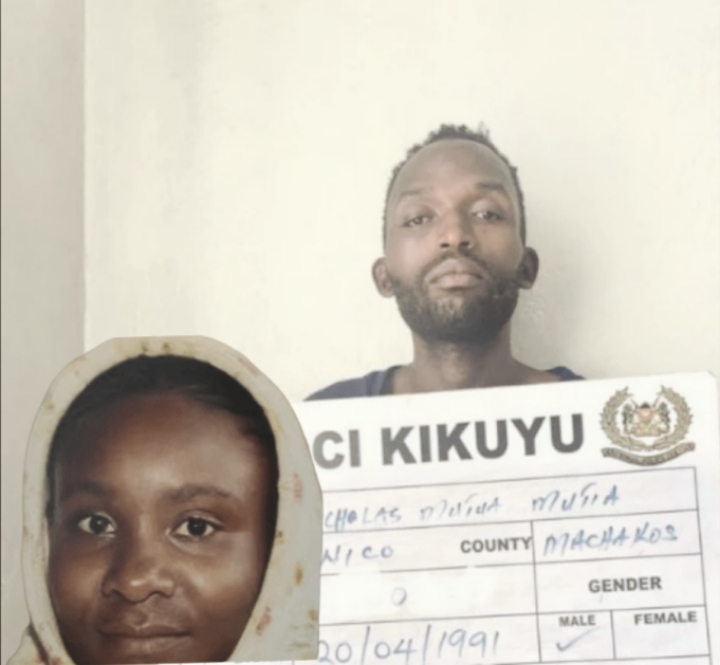In a chilling tale of abduction, extortion, and murder, the brutal killing of University of Nairobi student Jane Atila has sent shockwaves across the country, exposing deep cracks in Kenya’s policing and justice systems.
Atila, a second-year student at the University of Nairobi’s Kikuyu Campus, was reported missing on October 3, 2025. Her decomposing body was discovered two weeks later, dumped in a thicket inside the Kenya Forestry Research Institute (KEFRI) forest in Kikuyu, Kiambu County. What investigators are now uncovering paints a harrowing picture of a young life extinguished over a meagre KES 1,500 ransom.
The Chilling Ransom Call
According to Atila’s family, a man identified as Nicholas Mutua Mutia—now in police custody—allegedly contacted them on the night of her disappearance.
“Alisema kwamba yeye ndiye ako na dada yangu, na hatamwachilia mpaka atakapo pata pesa kutoka kwangu,” Jane’s brother, Patrick Mwangale, recounted tearfully.
The family says Mutua demanded KES 2,500, claiming it was the only way to secure Atila’s release. In desperation, Patrick managed to send KES 1,000 via M-Pesa, promising to raise the balance by the next day. But when the family failed to send the remaining KES 1,500, Jane was never heard from again.
Days later, villagers stumbled upon a partially decomposed body, bearing signs of torture and mutilation. Forensic fingerprint analysis on October 17 confirmed the worst — it was Jane Atila.
A Trail of Terror
Moments after Citizen TV aired Mutua’s arrest story, new victims emerged, offering disturbing testimonies that pointed to a serial predator with a pattern of violence.
Two women, who have since recorded statements at Kikuyu Police Station, allege that Mutua abducted them within the KEFRI forest, robbed them, and subjected them to torture and sexual assault before abandoning them for dead.
One survivor, speaking to Citizen TV on condition of anonymity, recounted the horror:
“Aliniambia, ‘Hutaenda, nitakuua. Nimeua wangapi? Nimekunywa damu ya wangapi? Ata wewe ujue siku yako ni leo.’ Kitu alikuwa anataka ni pesa.”
She says Mutua demanded her M-Pesa PIN and grew violent when he realized she did not have her phone. “Nilikuwa na pesa… lakini siku hiyo sikubeba hiyo simu yenye ilikuwa na pesa. Mungu alinisaidia,” she said.
Police say the women’s statements have now been incorporated into the broader murder investigation, and they are calling on other victims to come forward.
Human rights activists have condemned the police’s slow response, accusing them of negligence and indifference even after the family repeatedly sought help.
Jane’s brother claims he tried to report his sister’s abduction twice at Kabete Police Station, but officers allegedly dismissed him.
“Nilirudishwa kwa gate mara zote mbili. Walidismiss story yangu kama si ya maana,” Mwangale said.
Activists argue that the tragedy could have been prevented had the police acted promptly. “This case exposes a systemic failure,” said Sarah Wambui, a human rights advocate based in Nairobi. “A life was lost because police officers did not take a missing person report seriously.”
A Pattern of Predation
Sources within the investigation reveal that Mutua may have been operating a one-man extortion racket, luring victims from forest paths and secluded areas before demanding ransom from terrified families.
Preliminary reports show that he was known to frequent the KEFRI forest area, where several women have been attacked in recent months. The discovery of Atila’s body, coupled with emerging testimonies, suggests that the suspect’s criminal activities may have gone unchecked for some time.
Police are also holding two additional suspects believed to have aided Mutua in the abduction and killing. Detectives are analyzing phone records, M-Pesa transactions, and CCTV footage to establish a possible network or accomplices involved in the grisly crime.
Campus in Mourning, Country in Shock
At the University of Nairobi’s Kikuyu Campus, grief has turned into outrage. Students held a vigil in Atila’s honor, demanding justice and calling for improved security around the university and nearby forest trails.
“She was a bright and humble girl. To think her life ended over just KES 1,500 is beyond comprehension,” said one of her classmates.
The Larger Picture: A National Crisis
The case has reignited debate over gender-based violence and police inaction in Kenya. According to data from the National Crime Research Centre, reported cases of abduction, sexual assault, and femicide have risen sharply in the past year — yet conviction rates remain dismally low.
“This is not an isolated case,” noted activist Hassan Kilonzo. “It is a reflection of how women’s lives are routinely devalued and how perpetrators exploit systemic failures to continue preying on victims.”
A Family’s Plea
As investigations continue, Jane’s family remains inconsolable. “We will not rest until we get justice for Jane,” her mother said, breaking down in tears.
Meanwhile, police have vowed to pursue all leads to their conclusion. “We are treating this as a murder with aggravating circumstances,” a senior detective told the media. “No stone will be left unturned.”
Justice Delayed, Lives Destroyed
For now, Jane’s death stands as a grim reminder of how bureaucracy, negligence, and greed can conspire to destroy innocent lives. Her story — a university student killed because her family couldn’t raise KES 1,500 — is a stain on Kenya’s conscience.
As investigators build their case against Nicholas Mutua and his alleged accomplices, one question haunts the nation:
How many more “Janes” must die before the system learns to act?

